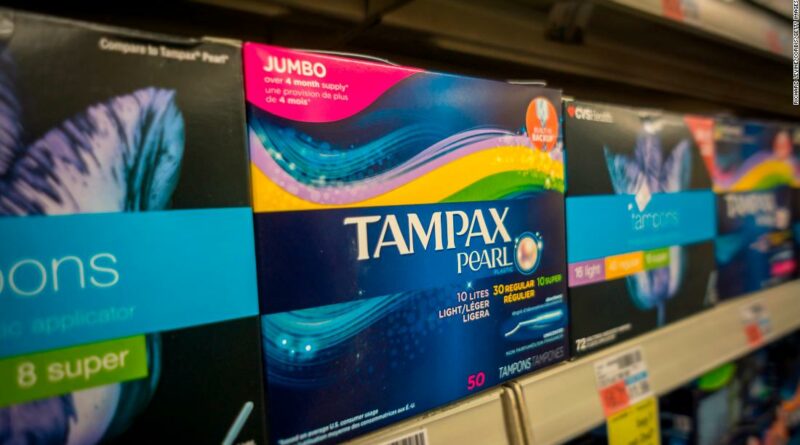Formula crisis spurs moms to try to rethink breastfeeding
New York (CNN Business)Supply chain problems and inflation have hit virtually all consumer goods, but women who menstruate are now facing an added strain as a shortage of period products hits the United States.
Top retailers and manufacturers acknowledged the shortages this week, confirming complaints that have been circulating on social media for months. The issue garnered national attention this week after an article in Time called the dearth of tampons and pads the shortage “no one is talking about.”
“I haven’t seen any products in stores for months,” one user posted on Reddit. “I’ve been ordering my tampons on Amazon and have been getting price gouged.”
Tampon prices are up significantly — nearly 10% from a year ago, according to Bloomberg. But an Amazon spokesperson denied rumors of price gouging, saying its policies “help ensure sellers are pricing their products competitively,” and that the company actively monitors pricing and removes offers that violate its fair pricing policy.
The shortages appear to stem from supply constraints around key materials like cotton and plastic, which are also used in personal protective equipment, and have been in high demand from the start of the pandemic. The war in Ukraine has further crimped supply because Russia and Ukraine are both major exporters of fertilizer, which is used to grow cotton. A drought in Texas hasn’t helped, either.
Shortages of raw materials and supply chain bottlenecks aren’t unique to period products, but much like the US infant formula shortage, there’s an unrelenting and urgent biological demand for them that can’t be easily substituted. People who menstruate can’t simply wait for the shelves to be restocked.
“Getting raw and packed materials to the places we need to get them to continues to be costly and highly volatile,” said Andre Schulten, Procter & Gamble’s chief financial officer, on a recent earnings call.
When Time asked Procter & Gamble, which owns the popular Tampax and Always brands, about the shortage, a company spokesperson blamed increased demand linked to an ad campaign featuring the comedian Amy Schumer.
Since the ads launched in July 2020, “retail sales growth has exploded,” the spokesperson told Time.
Of course, putting the blame on Schumer’s ads doesn’t account for why other brands also are hard to come by. A P&G representative told CNN Business Thursday that the Tampax team is “producing tampons 24/7 to meet the increased demand.”
“We understand it is frustrating for consumers when they can’t find what they need,” the P&G spokeperson said in an email. “We can assure you this is a temporary situation.”
As headlines about the Schumer comment circulated this week, the comedian, who’s spoken publicly about her hysterectomy last year, responded with a quip on social media.
“Whoa, I don’t even have a uterus,” she wrote on Instagram Thursday beneath a screenshot of a headline reading: “Why Amy Schumer is getting blamed for the national tampon shortage.”
Schumer’s representatives didn’t respond to a request for comment.
Both Walgreens and CVS said they are aware of tampon and other period product shortages in some areas and that they are working with their suppliers to ensure they can restock as soon as possible.
The tampon shortage shares uneasy parallels with the infant formula shortage, primarily in the unhelpful responses offered by men who aren’t directly affected by them. In both cases, women say they are being bombarded with comments — some genuinely offering help, others dripping with indignation over women’s supposed biological failings.
“If we could imagine a world where men had to breastfeed their babies … the formula shortage there would not be so dire,” wrote journalist Elizabeth Spiers in an opinion essay for The New York Times. “In that alternative reality…formula would not be stigmatized because it’s a choice men would want to have available to them.”
Source: Read Full Article

